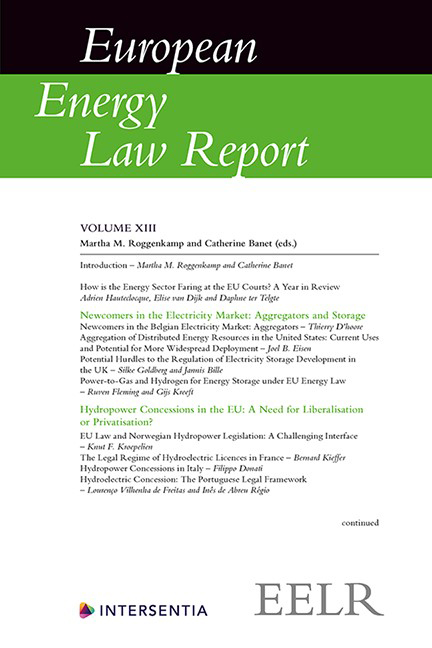Book contents
- Frontmatter
- Preface
- Contents
- List of Abbreviations
- List of Contributors
- Introduction
- Chapter I How is the Energy Sector Faring at the EU Courts? A Year in Review
- PART I NEWCOMERS IN THE ELECTRICITY MARKET: AGGREGATORS AND STORAGE
- PART II HYDROPOWER CONCESSIONS IN THE EU: A NEED FOR LIBERALISATION OR PRIVATISATION?
- PART III INVESTMENTS AND DISINVESTMENTS IN THE ENERGY SECTOR
- PART IV OFFSHORE DECOMMISSIONING IN THE NORTH SEA
- PART V CCS AS A CLIMATE TOOL: NORTH SEA PRACTICE
- PART VI FROM EU CLIMATE GOALS TO NATIONAL CLIMATE LAWS
Chapter XV - Decommissioning of Offshore Installations upon the UK Continental Shelf
Published online by Cambridge University Press: 30 April 2020
- Frontmatter
- Preface
- Contents
- List of Abbreviations
- List of Contributors
- Introduction
- Chapter I How is the Energy Sector Faring at the EU Courts? A Year in Review
- PART I NEWCOMERS IN THE ELECTRICITY MARKET: AGGREGATORS AND STORAGE
- PART II HYDROPOWER CONCESSIONS IN THE EU: A NEED FOR LIBERALISATION OR PRIVATISATION?
- PART III INVESTMENTS AND DISINVESTMENTS IN THE ENERGY SECTOR
- PART IV OFFSHORE DECOMMISSIONING IN THE NORTH SEA
- PART V CCS AS A CLIMATE TOOL: NORTH SEA PRACTICE
- PART VI FROM EU CLIMATE GOALS TO NATIONAL CLIMATE LAWS
Summary
INTRODUCTION
The decommissioning of an offshore installation is a complex and multi-faceted process encompassing cessation of production, the plugging and abandonment of wells, cleaning operations (which may involve the release of hydrocarbons and the use of chemicals), and the cutting, dismantling, lifting and transportation of a range of materials, some of which are potentially hazardous, for eventual re-use, recycling or disposal. All of this frequently takes place against a background of imperfect knowledge as to the state of the facilities being dismantled and in sometimes challenging offshore conditions. It is a process that is attended by significant commercial and physical risks and which involves both detailed legal regulation and an often-complex web of contractual relations between the operator of the installation and a host of service providers.
Some statistics may help to provide a sense of the scale of the task of decommissioning the infrastructure upon the United Kingdom Continental Shelf (“UKCS”). In excess of 500 installations have been emplaced on the UKCS since 1967, varying in type from small-scale subsea installations to truly monolithic gravity-based concrete structures; it is anticipated that between 2018 and 2027, 71 of those will have been decommissioned. Some 5,000 wells have been drilled and some 3,000 pipelines laid, with a cumulative length of 15,000 kilometres. The UK Government estimates that around 10 per cent of the UK's offshore infrastructure has been decommissioned to date. Estimates of the total cost of this decommissioning activity (past and future) have varied significantly. Around 2010, £20 billion was a commonly-given figure. More recently, cost estimates have risen, with the Wood Review suggesting a range of between £35 and £50 billion. In 2017, the Oil and Gas Authority (“OGA”) estimated a cost of £59.7 billion, whilst setting £39 billion as an aspirational target of what could be achieved if the industry were to be able to unlock cost savings through a combination of experiential learning and improved efficiencies. The 2019 estimate from the OGA has adjusted the projected total down to £49 billion. While it is too early to state with confidence that cost estimates have peaked, there are some signs that the efficiencies to which the OGA referred are starting to take effect.
- Type
- Chapter
- Information
- European Energy Law Report XIII , pp. 307 - 328Publisher: IntersentiaPrint publication year: 2020



